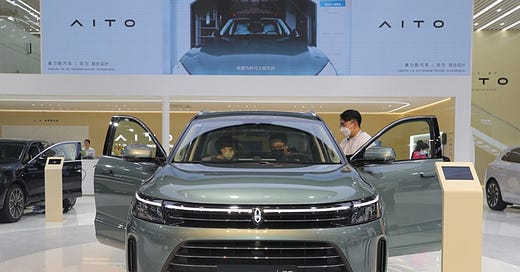Tech Insider: Huawei EV Partnership Surprises, Obstacles Loom in China’s AI Craze
Influencers told to show real names on social media, Neta Auto follows fellow EV-makers into UAE
Huawei EV partnership surprises with hit vehicle
A new electric car co-developed by Huawei Technologies Co. Ltd. and automaker Seres Group Co. Ltd. has received over 60,000 orders within a month after the launch of the Aito M7 SUV on Sept. 12. With demand exceeding the two partners’ expectations, Huawei has committed 1 billion yuan ($136.5 million) of additional investment to guarantee delivery.
Richard Yu, chairman of Huawei’s smart car unit, called the triumph a “rise from the dead.” Inside Huawei, the M7 is viewed as another Mate 7, the flagship smartphone that reversed the telecom equipment giant’s reputation as a budget phone-maker and helped to save Yu’s job.
After several rounds of U.S. sanctions since August 2020 crippled its once-lucrative smartphone business, Huawei has been eager to explore new sources of revenue. In order to maintain Huawei’s consumer products sales channels, Yu created the Huawei Smart Selection model to partner with automakers to make and sell cars.
Obstacles loom in China’s AI boom
Since Beijing opened the floodgates for Chinese firms to launch their artificial intelligence (AI) services, homegrown large language models (LLMs) offerings have accelerated, with the number of releases this year surpassing that of their U.S. competitors.
Among the first large AI models to get the green light from Beijing are those developed by some of the country’s biggest tech firms including Baidu Inc., Alibaba Group Holding Ltd. and Tencent Holdings Ltd., company announcements show.
The wave of approvals comes as China ramps up efforts to rival the U.S in technology — specifically AI. It has spurred more tech firms and startups to jump on the latest LLM bandwagon as they capitalize on the frenzy around OpenAI’s ChatGPT to get a slice of the market.
However, some industry insiders anticipate that regulators will tighten their grip over the issuance of licenses granted to new models, amid potential concerns of an overcrowded market and uncertainties about the models’ application and profitability.
EV-maker Neta Auto follows BYD, Geely into UAE
Neta Auto cars will be available in the United Arab Emirates (UAE) from next year, the Chinese electric-vehicle (EV) maker said as it joins peers in expanding into the lucrative Middle East market.
The Hozon New Energy Automobile Co. Ltd. brand has partnered with UAE car dealer EIH Automotive & Trading to bring its flagship models to the major importer of Chinese cars, according to a Monday statement.
The partnership marks Neta Auto’s latest expansion following its forays into countries such as Thailand, Israel and Jordan.
The UAE, which is accelerating its transition to a green economy, has become a popular destination for Chinese EV-makers, with BYD Co. Ltd. and Zhejiang Geely Holding Group Co. Ltd. both expanding there this year.
Popular influencers told to show real names on social media
China’s major social media platforms including Weibo, WeChat, Douyin and Kuaishou have told some of their most popular content creators to display their real identities in the latest move to regulate online information distribution.
The new rules will mainly affect content creators, often referred to as self-media, in areas such as current affairs, military, finance, law and health care. Users and accounts primarily focused on sharing details of their personal lives are not affected, according to statements from the social media platforms.
Self-media accounts, such as individual broadcasters or influencers, must show accurate names matching their submitted IDs or business licenses, the statements said. Failure to authenticate or authorize may impact content and revenue until completion of the required process.




